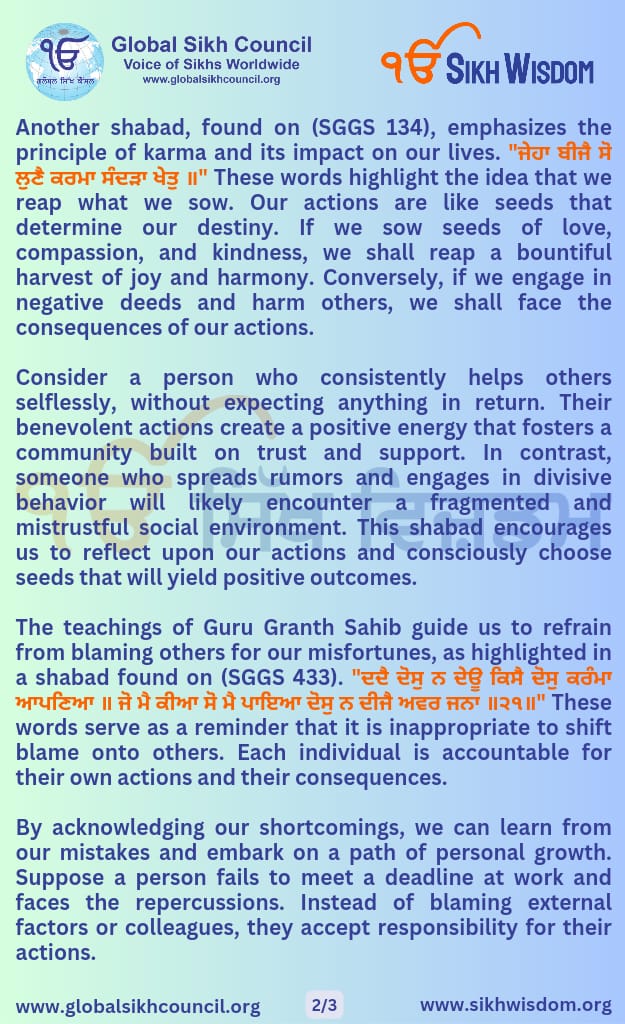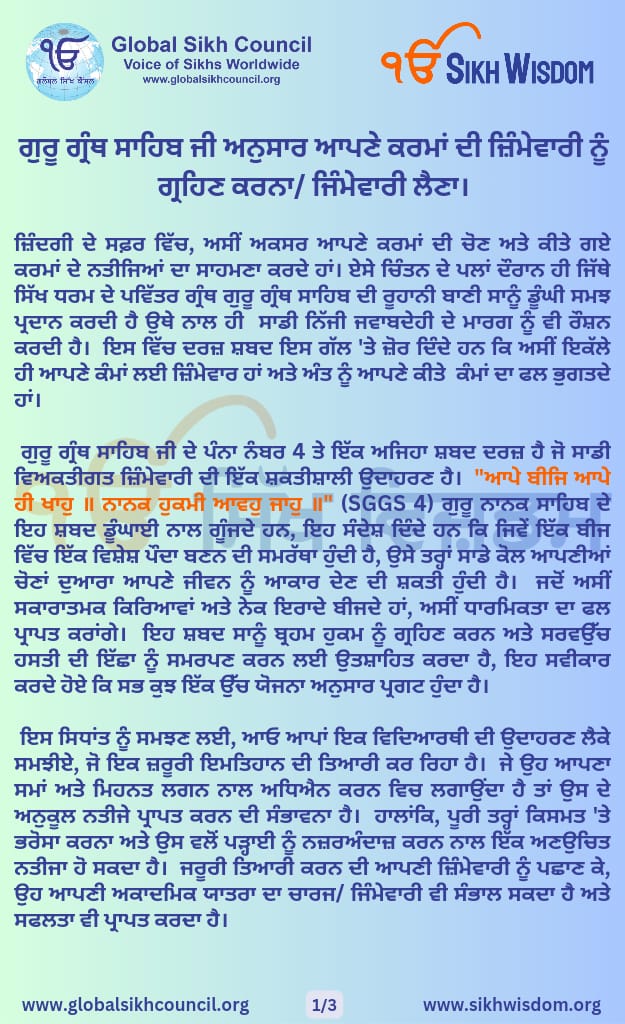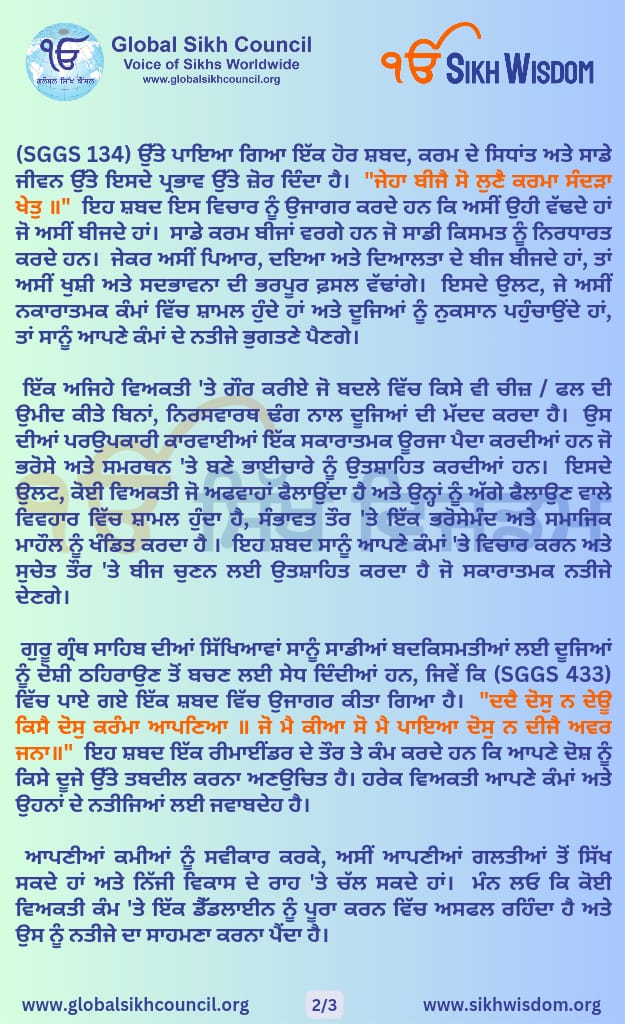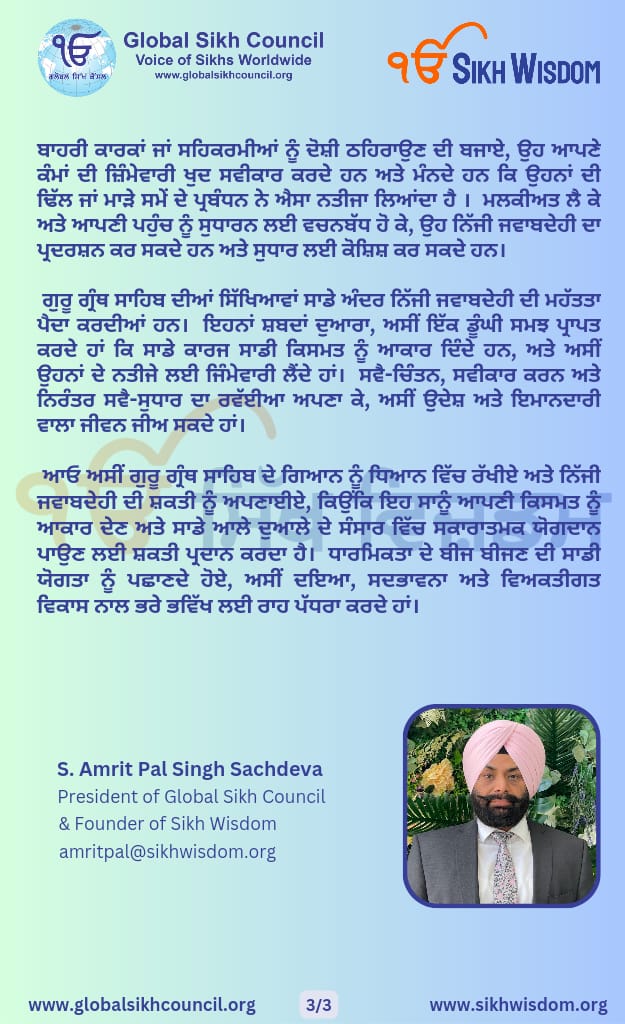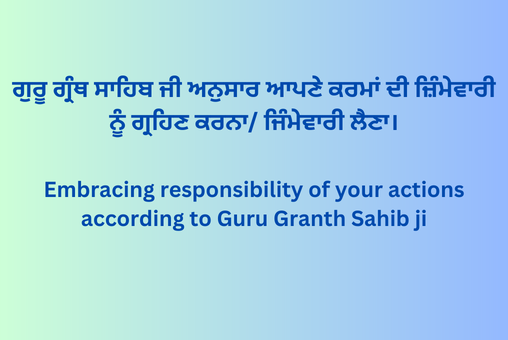ਗੁਰੂ ਗ੍ਰੰਥ ਸਾਹਿਬ ਜੀ ਅਨੁਸਾਰ ਆਪਣੇ ਕਰਮਾਂ ਦੀ ਜ਼ਿੰਮੇਵਾਰੀ ਨੂੰ ਗ੍ਰਹਿਣ ਕਰਨਾ/ ਜਿੰਮੇਵਾਰੀ ਲੈਣਾ।
ਜ਼ਿੰਦਗੀ ਦੇ ਸਫ਼ਰ ਵਿੱਚ, ਅਸੀਂ ਅਕਸਰ ਆਪਣੇ ਕਰਮਾਂ ਦੀ ਚੋਣ ਅਤੇ ਕੀਤੇ ਗਏ ਕਰਮਾਂ ਦੇ ਨਤੀਜਿਆਂ ਦਾ ਸਾਹਮਣਾ ਕਰਦੇ ਹਾਂ। ਏਸੇ ਚਿੰਤਨ ਦੇ ਪਲਾਂ ਦੌਰਾਨ ਹੀ ਜਿੱਥੇ ਸਿੱਖ ਧਰਮ ਦੇ ਪਵਿੱਤਰ ਗ੍ਰੰਥ ਗੁਰੂ ਗ੍ਰੰਥ ਸਾਹਿਬ ਦੀ ਰੂਹਾਨੀ ਬਾਣੀ ਸਾਨੂੰ ਡੂੰਘੀ ਸਮਝ ਪ੍ਰਦਾਨ ਕਰਦੀ ਹੈ ਉਥੇ ਨਾਲ ਹੀ ਸਾਡੀ ਨਿੱਜੀ ਜਵਾਬਦੇਹੀ ਦੇ ਮਾਰਗ ਨੂੰ ਵੀ ਰੌਸ਼ਨ ਕਰਦੀ ਹੈ। ਇਸ ਵਿੱਚ ਦਰਜ਼ ਸ਼ਬਦ ਇਸ ਗੱਲ ‘ਤੇ ਜ਼ੋਰ ਦਿੰਦੇ ਹਨ ਕਿ ਅਸੀਂ ਇਕੱਲੇ ਹੀ ਆਪਣੇ ਕੰਮਾਂ ਲਈ ਜ਼ਿੰਮੇਵਾਰ ਹਾਂ ਅਤੇ ਅੰਤ ਨੂੰ ਆਪਣੇ ਕੀਤੇ ਕੰਮਾਂ ਦਾ ਫਲ ਭੁਗਤਦੇ ਹਾਂ।
ਗੁਰੂ ਗ੍ਰੰਥ ਸਾਹਿਬ ਜੀ ਦੇ ਪੰਨਾ ਨੰਬਰ 4 ਤੇ ਇੱਕ ਅਜਿਹਾ ਸ਼ਬਦ ਦਰਜ਼ ਹੈ ਜੋ ਸਾਡੀ ਵਿਅਕਤੀਗਤ ਜ਼ਿੰਮੇਵਾਰੀ ਦੀ ਇੱਕ ਸ਼ਕਤੀਸ਼ਾਲੀ ਉਦਾਹਰਣ ਹੈ। “ਆਪੇ ਬੀਜਿ ਆਪੇ ਹੀ ਖਾਹੁ ॥ ਨਾਨਕ ਹੁਕਮੀ ਆਵਹੁ ਜਾਹੁ ॥(SGGS 4) ਗੁਰੂ ਨਾਨਕ ਸਾਹਿਬ ਦੇ ਇਹ ਸ਼ਬਦ ਡੂੰਘਾਈ ਨਾਲ ਗੂੰਜਦੇ ਹਨ, ਇਹ ਸੰਦੇਸ਼ ਦਿੰਦੇ ਹਨ ਕਿ ਜਿਵੇਂ ਇੱਕ ਬੀਜ ਵਿੱਚ ਇੱਕ ਵਿਸ਼ੇਸ਼ ਪੌਦਾ ਬਣਨ ਦੀ ਸਮਰੱਥਾ ਹੁੰਦੀ ਹੈ, ਉਸੇ ਤਰ੍ਹਾਂ ਸਾਡੇ ਕੋਲ ਆਪਣੀਆਂ ਚੋਣਾਂ ਦੁਆਰਾ ਆਪਣੇ ਜੀਵਨ ਨੂੰ ਆਕਾਰ ਦੇਣ ਦੀ ਸ਼ਕਤੀ ਹੁੰਦੀ ਹੈ। ਜਦੋਂ ਅਸੀਂ ਸਕਾਰਾਤਮਕ ਕਿਰਿਆਵਾਂ ਅਤੇ ਨੇਕ ਇਰਾਦੇ ਬੀਜਦੇ ਹਾਂ, ਅਸੀਂ ਧਾਰਮਿਕਤਾ ਦਾ ਫਲ ਪ੍ਰਾਪਤ ਕਰਾਂਗੇ। ਇਹ ਸ਼ਬਦ ਸਾਨੂੰ ਬ੍ਰਹਮ ਹੁਕਮ ਨੂੰ ਗ੍ਰਹਿਣ ਕਰਨ ਅਤੇ ਸਰਵਉੱਚ ਹਸਤੀ ਦੀ ਇੱਛਾ ਨੂੰ ਸਮਰਪਣ ਕਰਨ ਲਈ ਉਤਸ਼ਾਹਿਤ ਕਰਦਾ ਹੈ, ਇਹ ਸਵੀਕਾਰ ਕਰਦੇ ਹੋਏ ਕਿ ਸਭ ਕੁਝ ਇੱਕ ਉੱਚ ਯੋਜਨਾ ਅਨੁਸਾਰ ਪ੍ਰਗਟ ਹੁੰਦਾ ਹੈ।
ਇਸ ਸਿਧਾਂਤ ਨੂੰ ਸਮਝਣ ਲਈ, ਆਓ ਆਪਾਂ ਇਕ ਵਿਦਿਆਰਥੀ ਦੀ ਉਦਾਹਰਣ ਲੈਕੇ ਸਮਝੀਏ, ਜੋ ਇਕ ਜ਼ਰੂਰੀ ਇਮਤਿਹਾਨ ਦੀ ਤਿਆਰੀ ਕਰ ਰਿਹਾ ਹੈ। ਜੇ ਉਹ ਆਪਣਾ ਸਮਾਂ ਅਤੇ ਮਿਹਨਤ ਲਗਨ ਨਾਲ ਅਧਿਐਨ ਕਰਨ ਵਿਚ ਲਗਾਉਂਦਾ ਹੈ ਤਾਂ ਉਸ ਦੇ ਅਨੁਕੂਲ ਨਤੀਜੇ ਪ੍ਰਾਪਤ ਕਰਨ ਦੀ ਸੰਭਾਵਨਾ ਹੈ। ਹਾਲਾਂਕਿ, ਪੂਰੀ ਤਰ੍ਹਾਂ ਕਿਸਮਤ ‘ਤੇ ਭਰੋਸਾ ਕਰਨਾ ਅਤੇ ਉਸ ਵਲੋਂ ਪੜ੍ਹਾਈ ਨੂੰ ਨਜ਼ਰਅੰਦਾਜ਼ ਕਰਨ ਨਾਲ ਇੱਕ ਅਣਉਚਿਤ ਨਤੀਜਾ ਹੋ ਸਕਦਾ ਹੈ। ਜਰੂਰੀ ਤਿਆਰੀ ਕਰਨ ਦੀ ਆਪਣੀ ਜ਼ਿੰਮੇਵਾਰੀ ਨੂੰ ਪਛਾਣ ਕੇ, ਉਹ ਆਪਣੀ ਅਕਾਦਮਿਕ ਯਾਤਰਾ ਦਾ ਚਾਰਜ/ ਜਿੰਮੇਵਾਰੀ ਵੀ ਸੰਭਾਲ ਸਕਦਾ ਹੈ ਅਤੇ ਸਫਲਤਾ ਵੀ ਪ੍ਰਾਪਤ ਕਰਦਾ ਹੈ।
(SGGS 134) ਉੱਤੇ ਪਾਇਆ ਗਿਆ ਇੱਕ ਹੋਰ ਸ਼ਬਦ, ਕਰਮ ਦੇ ਸਿਧਾਂਤ ਅਤੇ ਸਾਡੇ ਜੀਵਨ ਉੱਤੇ ਇਸਦੇ ਪ੍ਰਭਾਵ ਉੱਤੇ ਜ਼ੋਰ ਦਿੰਦਾ ਹੈ। “ਜੇਹਾ ਬੀਜੈ ਸੋ ਲੁਣੈ ਕਰਮਾ ਸੰਦੜਾ ਖੇਤੁ ॥” ਇਹ ਸ਼ਬਦ ਇਸ ਵਿਚਾਰ ਨੂੰ ਉਜਾਗਰ ਕਰਦੇ ਹਨ ਕਿ ਅਸੀਂ ਉਹੀ ਵੱਢਦੇ ਹਾਂ ਜੋ ਅਸੀਂ ਬੀਜਦੇ ਹਾਂ। ਸਾਡੇ ਕਰਮ ਬੀਜਾਂ ਵਰਗੇ ਹਨ ਜੋ ਸਾਡੀ ਕਿਸਮਤ ਨੂੰ ਨਿਰਧਾਰਤ ਕਰਦੇ ਹਨ। ਜੇਕਰ ਅਸੀਂ ਪਿਆਰ, ਦਇਆ ਅਤੇ ਦਿਆਲਤਾ ਦੇ ਬੀਜ ਬੀਜਦੇ ਹਾਂ, ਤਾਂ ਅਸੀਂ ਖੁਸ਼ੀ ਅਤੇ ਸਦਭਾਵਨਾ ਦੀ ਭਰਪੂਰ ਫ਼ਸਲ ਵੱਢਾਂਗੇ। ਇਸਦੇ ਉਲਟ, ਜੇ ਅਸੀਂ ਨਕਾਰਾਤਮਕ ਕੰਮਾਂ ਵਿੱਚ ਸ਼ਾਮਲ ਹੁੰਦੇ ਹਾਂ ਅਤੇ ਦੂਜਿਆਂ ਨੂੰ ਨੁਕਸਾਨ ਪਹੁੰਚਾਉਂਦੇ ਹਾਂ, ਤਾਂ ਸਾਨੂੰ ਆਪਣੇ ਕੰਮਾਂ ਦੇ ਨਤੀਜੇ ਭੁਗਤਣੇ ਪੈਣਗੇ।
ਇੱਕ ਅਜਿਹੇ ਵਿਅਕਤੀ ‘ਤੇ ਗੌਰ ਕਰੀਏ ਜੋ ਬਦਲੇ ਵਿੱਚ ਕਿਸੇ ਵੀ ਚੀਜ਼ / ਫਲ ਦੀ ਉਮੀਦ ਕੀਤੇ ਬਿਨਾਂ, ਨਿਰਸਵਾਰਥ ਢੰਗ ਨਾਲ ਦੂਜਿਆਂ ਦੀ ਮੱਦਦ ਕਰਦਾ ਹੈ। ਉਸ ਦੀਆਂ ਪਰਉਪਕਾਰੀ ਕਾਰਵਾਈਆਂ ਇੱਕ ਸਕਾਰਾਤਮਕ ਊਰਜਾ ਪੈਦਾ ਕਰਦੀਆਂ ਹਨ ਜੋ ਭਰੋਸੇ ਅਤੇ ਸਮਰਥਨ ‘ਤੇ ਬਣੇ ਭਾਈਚਾਰੇ ਨੂੰ ਉਤਸ਼ਾਹਿਤ ਕਰਦੀਆਂ ਹਨ। ਇਸਦੇ ਉਲਟ, ਕੋਈ ਵਿਅਕਤੀ ਜੋ ਅਫਵਾਹਾਂ ਫੈਲਾਉਂਦਾ ਹੈ ਅਤੇ ਉਨ੍ਹਾਂ ਨੂੰ ਅੱਗੇ ਫੈਲਾਉਣ ਵਾਲੇ ਵਿਵਹਾਰ ਵਿੱਚ ਸ਼ਾਮਲ ਹੁੰਦਾ ਹੈ, ਸੰਭਾਵਤ ਤੌਰ ‘ਤੇ ਇੱਕ ਭਰੋਸੇਮੰਦ ਅਤੇ ਸਮਾਜਿਕ ਮਾਹੌਲ ਨੂੰ ਖੰਡਿਤ ਕਰਦਾ ਹੈ । ਇਹ ਸ਼ਬਦ ਸਾਨੂੰ ਆਪਣੇ ਕੰਮਾਂ ‘ਤੇ ਵਿਚਾਰ ਕਰਨ ਅਤੇ ਸੁਚੇਤ ਤੌਰ ‘ਤੇ ਬੀਜ ਚੁਣਨ ਲਈ ਉਤਸ਼ਾਹਿਤ ਕਰਦਾ ਹੈ ਜੋ ਸਕਾਰਾਤਮਕ ਨਤੀਜੇ ਦੇਣਗੇ।
ਗੁਰੂ ਗ੍ਰੰਥ ਸਾਹਿਬ ਦੀਆਂ ਸਿੱਖਿਆਵਾਂ ਸਾਨੂੰ ਸਾਡੀਆਂ ਬਦਕਿਸਮਤੀਆਂ ਲਈ ਦੂਜਿਆਂ ਨੂੰ ਦੋਸ਼ੀ ਠਹਿਰਾਉਣ ਤੋਂ ਬਚਣ ਲਈ ਸੇਧ ਦਿੰਦੀਆਂ ਹਨ, ਜਿਵੇਂ ਕਿ (SGGS 433) ਵਿੱਚ ਪਾਏ ਗਏ ਇੱਕ ਸ਼ਬਦ ਵਿੱਚ ਉਜਾਗਰ ਕੀਤਾ ਗਿਆ ਹੈ। “ਦਦੈ ਦੋਸੁ ਨ ਦੇਊ ਕਿਸੈ ਦੋਸੁ ਕਰੰਮਾ ਆਪਣਿਆ ॥ ਜੋ ਮੈ ਕੀਆ ਸੋ ਮੈ ਪਾਇਆ ਦੋਸੁ ਨ ਦੀਜੈ ਅਵਰ ਜਨਾ॥ ਇਹ ਸ਼ਬਦ ਇੱਕ ਰੀਮਾਈਂਡਰ ਦੇ ਤੌਰ ਤੇ ਕੰਮ ਕਰਦੇ ਹਨ ਕਿ ਆਪਣੇ ਦੋਸ਼ ਨੂੰ ਕਿਸੇ ਦੂਜੇ ਉੱਤੇ ਤਬਦੀਲ ਕਰਨਾ ਅਣਉਚਿਤ ਹੈ। ਹਰੇਕ ਵਿਅਕਤੀ ਆਪਣੇ ਕੰਮਾਂ ਅਤੇ ਉਹਨਾਂ ਦੇ ਨਤੀਜਿਆਂ ਲਈ ਜਵਾਬਦੇਹ ਹੈ।
ਆਪਣੀਆਂ ਕਮੀਆਂ ਨੂੰ ਸਵੀਕਾਰ ਕਰਕੇ, ਅਸੀਂ ਆਪਣੀਆਂ ਗਲਤੀਆਂ ਤੋਂ ਸਿੱਖ ਸਕਦੇ ਹਾਂ ਅਤੇ ਨਿੱਜੀ ਵਿਕਾਸ ਦੇ ਰਾਹ ‘ਤੇ ਚੱਲ ਸਕਦੇ ਹਾਂ। ਮੰਨ ਲਓ ਕਿ ਕੋਈ ਵਿਅਕਤੀ ਕੰਮ ‘ਤੇ ਇੱਕ ਡੈੱਡਲਾਈਨ ਨੂੰ ਪੂਰਾ ਕਰਨ ਵਿੱਚ ਅਸਫਲ ਰਹਿੰਦਾ ਹੈ ਅਤੇ ਉਸ ਨੂੰ ਨਤੀਜੇ ਦਾ ਸਾਹਮਣਾ ਕਰਨਾ ਪੈਂਦਾ ਹੈ। ਬਾਹਰੀ ਕਾਰਕਾਂ ਜਾਂ ਸਹਿਕਰਮੀਆਂ ਨੂੰ ਦੋਸ਼ੀ ਠਹਿਰਾਉਣ ਦੀ ਬਜਾਏ, ਉਹ ਆਪਣੇ ਕੰਮਾਂ ਦੀ ਜ਼ਿੰਮੇਵਾਰੀ ਖੁਦ ਸਵੀਕਾਰ ਕਰਦੇ ਹਨ ਅਤੇ ਮੰਨਦੇ ਹਨ ਕਿ ਉਹਨਾਂ ਦੀ ਢਿੱਲ ਜਾਂ ਮਾੜੇ ਸਮੇਂ ਦੇ ਪ੍ਰਬੰਧਨ ਨੇ ਐਸਾ ਨਤੀਜਾ ਲਿਆਂਦਾ ਹੈ । ਮਲਕੀਅਤ ਲੈ ਕੇ ਅਤੇ ਆਪਣੀ ਪਹੁੰਚ ਨੂੰ ਸੁਧਾਰਨ ਲਈ ਵਚਨਬੱਧ ਹੋ ਕੇ, ਉਹ ਨਿੱਜੀ ਜਵਾਬਦੇਹੀ ਦਾ ਪ੍ਰਦਰਸ਼ਨ ਕਰ ਸਕਦੇ ਹਨ ਅਤੇ ਸੁਧਾਰ ਲਈ ਕੋਸ਼ਿਸ਼ ਕਰ ਸਕਦੇ ਹਨ।
ਗੁਰੂ ਗ੍ਰੰਥ ਸਾਹਿਬ ਦੀਆਂ ਸਿੱਖਿਆਵਾਂ ਸਾਡੇ ਅੰਦਰ ਨਿੱਜੀ ਜਵਾਬਦੇਹੀ ਦੀ ਮਹੱਤਤਾ ਪੈਦਾ ਕਰਦੀਆਂ ਹਨ। ਇਹਨਾਂ ਸ਼ਬਦਾਂ ਦੁਆਰਾ, ਅਸੀਂ ਇੱਕ ਡੂੰਘੀ ਸਮਝ ਪ੍ਰਾਪਤ ਕਰਦੇ ਹਾਂ ਕਿ ਸਾਡੇ ਕਾਰਜ ਸਾਡੀ ਕਿਸਮਤ ਨੂੰ ਆਕਾਰ ਦਿੰਦੇ ਹਨ, ਅਤੇ ਅਸੀਂ ਉਹਨਾਂ ਦੇ ਨਤੀਜੇ ਲਈ ਜਿੰਮੇਵਾਰੀ ਲੈਂਦੇ ਹਾਂ। ਸਵੈ-ਚਿੰਤਨ, ਸਵੀਕਾਰ ਕਰਨ ਅਤੇ ਨਿਰੰਤਰ ਸਵੈ-ਸੁਧਾਰ ਦਾ ਰਵੱਈਆ ਅਪਣਾ ਕੇ, ਅਸੀਂ ਉਦੇਸ਼ ਅਤੇ ਇਮਾਨਦਾਰੀ ਵਾਲਾ ਜੀਵਨ ਜੀਅ ਸਕਦੇ ਹਾਂ।
ਆਓ ਅਸੀਂ ਗੁਰੂ ਗ੍ਰੰਥ ਸਾਹਿਬ ਦੇ ਗਿਆਨ ਨੂੰ ਧਿਆਨ ਵਿੱਚ ਰੱਖੀਏ ਅਤੇ ਨਿੱਜੀ ਜਵਾਬਦੇਹੀ ਦੀ ਸ਼ਕਤੀ ਨੂੰ ਅਪਣਾਈਏ, ਕਿਉਂਕਿ ਇਹ ਸਾਨੂੰ ਆਪਣੀ ਕਿਸਮਤ ਨੂੰ ਆਕਾਰ ਦੇਣ ਅਤੇ ਸਾਡੇ ਆਲੇ ਦੁਆਲੇ ਦੇ ਸੰਸਾਰ ਵਿੱਚ ਸਕਾਰਾਤਮਕ ਯੋਗਦਾਨ ਪਾਉਣ ਲਈ ਸ਼ਕਤੀ ਪ੍ਰਦਾਨ ਕਰਦਾ ਹੈ। ਧਾਰਮਿਕਤਾ ਦੇ ਬੀਜ ਬੀਜਣ ਦੀ ਸਾਡੀ ਯੋਗਤਾ ਨੂੰ ਪਛਾਣਦੇ ਹੋਏ, ਅਸੀਂ ਦਇਆ, ਸਦਭਾਵਨਾ ਅਤੇ ਵਿਅਕਤੀਗਤ ਵਿਕਾਸ ਨਾਲ ਭਰੇ ਭਵਿੱਖ ਲਈ ਰਾਹ ਪੱਧਰਾ ਕਰਦੇ ਹਾਂ।
Embracing responsibility of your actions according to Guru Granth Sahib ji
In the journey of life, we often come face to face with the repercussions of our choices and actions. It is during these moments of contemplation that the profound wisdom of Guru Granth Sahib, the sacred scripture of Sikhism, shines brightly, illuminating the path of personal accountability. The verses within its pages emphasize that we alone are responsible for our deeds and ultimately bear the fruits of our actions.
One such verse, found on (SGGS 4), serves as a powerful reminder of our individual responsibility. “ਆਪੇ ਬੀਜਿ ਆਪੇ ਹੀ ਖਾਹੁ ॥ ਨਾਨਕ ਹੁਕਮੀ ਆਵਹੁ ਜਾਹੁ ॥੨੦॥” These words of Guru Nanak Sahib resonate deeply, conveying the message that just as a seed contains the potential to grow into a specific plant, we possess the power to shape our lives through our choices. When we sow positive actions and virtuous intentions, we shall reap the fruits of righteousness. This shabad encourages us to embrace the divine order and surrender to the will of the Supreme Being, acknowledging that everything unfolds according to a higher plan.
To illustrate this principle, let us consider the example of a student preparing for an important exam. If they invest their time and effort into studying diligently, they are likely to achieve favorable results. However, relying solely on luck and neglecting their studies may lead to an unfavorable outcome. By recognizing their responsibility to adequately prepare, they can take charge of their academic journey and manifest success.
Another shabad, found on (SGGS 134), emphasizes the principle of karma and its impact on our lives. “ਜੇਹਾ ਬੀਜੈ ਸੋ ਲੁਣੈ ਕਰਮਾ ਸੰਦੜਾ ਖੇਤੁ ॥” These words highlight the idea that we reap what we sow. Our actions are like seeds that determine our destiny. If we sow seeds of love, compassion, and kindness, we shall reap a bountiful harvest of joy and harmony. Conversely, if we engage in negative deeds and harm others, we shall face the consequences of our actions.
Consider a person who consistently helps others selflessly, without expecting anything in return. Their benevolent actions create a positive energy that fosters a community built on trust and support. In contrast, someone who spreads rumors and engages in divisive behavior will likely encounter a fragmented and mistrustful social environment. This shabad encourages us to reflect upon our actions and consciously choose seeds that will yield positive outcomes.
The teachings of Guru Granth Sahib guide us to refrain from blaming others for our misfortunes, as highlighted in a shabad found on (SGGS 433). “ਦਦੈ ਦੋਸੁ ਨ ਦੇਊ ਕਿਸੈ ਦੋਸੁ ਕਰੰਮਾ ਆਪਣਿਆ ॥ ਜੋ ਮੈ ਕੀਆ ਸੋ ਮੈ ਪਾਇਆ ਦੋਸੁ ਨ ਦੀਜੈ ਅਵਰ ਜਨਾ ॥੨੧॥” These words serve as a reminder that it is inappropriate to shift blame onto others. Each individual is accountable for their own actions and their consequences.
By acknowledging our shortcomings, we can learn from our mistakes and embark on a path of personal growth. Suppose a person fails to meet a deadline at work and faces the repercussions. Instead of blaming external factors or colleagues, they accept responsibility for their actions. They recognize that their procrastination or poor time management led to the outcome. By taking ownership and committing to rectify their approach, they can demonstrate personal accountability and strive for improvement.
The teachings of Guru Granth Sahib instill in us the importance of personal accountability. Through these shabads, we gain a profound understanding that our actions shape our destiny, and we bear the responsibility for the consequences they bring. By adopting an attitude of self-reflection, acceptance, and continuous self-improvement, we can lead a life of purpose and integrity.
Let us heed the wisdom of Guru Granth Sahib and embrace the power of personal accountability, for it empowers us to shape our own destinies and contribute positively to the world around us. In recognizing our ability to sow the seeds of righteousness, we pave the way for a future filled with compassion, harmony, and personal growth
Author: Amrit Pal Singh Sachdeva

